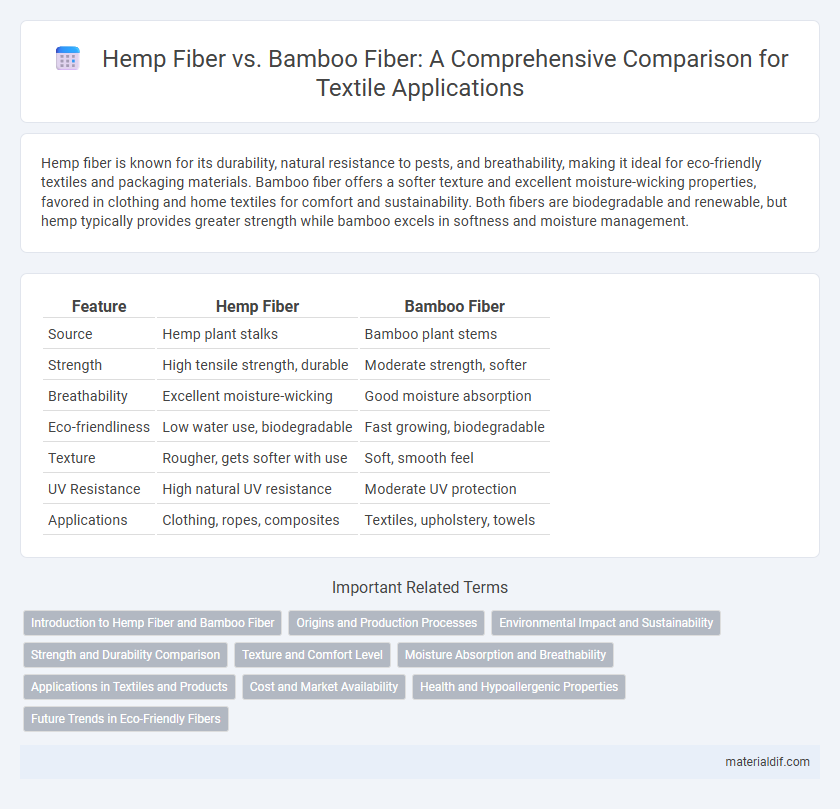Hemp fiber is known for its durability, natural resistance to pests, and breathability, making it ideal for eco-friendly textiles and packaging materials. Bamboo fiber offers a softer texture and excellent moisture-wicking properties, favored in clothing and home textiles for comfort and sustainability. Both fibers are biodegradable and renewable, but hemp typically provides greater strength while bamboo excels in softness and moisture management.
Table of Comparison
| Feature | Hemp Fiber | Bamboo Fiber |
|---|---|---|
| Source | Hemp plant stalks | Bamboo plant stems |
| Strength | High tensile strength, durable | Moderate strength, softer |
| Breathability | Excellent moisture-wicking | Good moisture absorption |
| Eco-friendliness | Low water use, biodegradable | Fast growing, biodegradable |
| Texture | Rougher, gets softer with use | Soft, smooth feel |
| UV Resistance | High natural UV resistance | Moderate UV protection |
| Applications | Clothing, ropes, composites | Textiles, upholstery, towels |
Introduction to Hemp Fiber and Bamboo Fiber
Hemp fiber, derived from the stalk of the Cannabis sativa plant, is renowned for its strength, durability, and eco-friendly properties, making it a sustainable choice for textiles and industrial applications. Bamboo fiber, sourced from the pulp of bamboo grass, is prized for its softness, antibacterial qualities, and rapid renewability, contributing to its popularity in clothing and home textiles. Both fibers offer unique environmental benefits, with hemp requiring minimal water and pesticides, while bamboo grows quickly with little need for fertilizers.
Origins and Production Processes
Hemp fiber originates from the stalks of the Cannabis sativa plant, cultivated for thousands of years primarily in Europe and Asia, where its strong, durable fibers are extracted through retting and decortication processes. Bamboo fiber, derived from the bamboo grass primarily grown in China and Southeast Asia, undergoes mechanical crushing and chemical treatment to break down the cellulose before being spun into soft textiles. The environmentally sustainable production of hemp fiber typically involves fewer chemicals and water compared to bamboo fiber processing, which often relies on more intensive chemical methods for fiber extraction.
Environmental Impact and Sustainability
Hemp fiber requires significantly less water and pesticides compared to bamboo, making it a more environmentally sustainable choice for textile production. Hemp plants grow quickly and improve soil health through phytoremediation, whereas bamboo's rapid growth can lead to monoculture plantations that reduce biodiversity. Overall, hemp fiber offers a lower carbon footprint and greater ecological benefits than bamboo fiber in sustainable fiber sourcing.
Strength and Durability Comparison
Hemp fiber exhibits superior tensile strength and long-lasting durability compared to bamboo fiber, making it an ideal choice for heavy-duty textiles and industrial applications. Its robust cellulose structure resists wear and tear, ensuring enhanced longevity in products subjected to frequent use. Bamboo fiber, while softer and more flexible, tends to have lower mechanical strength and wears down faster under stress, limiting its durability in high-strength applications.
Texture and Comfort Level
Hemp fiber offers a coarse texture with high durability, making it ideal for heavy-duty textiles but less soft against the skin. Bamboo fiber provides a smoother and silkier feel with excellent moisture-wicking properties, enhancing overall comfort for everyday wear. The natural breathability of bamboo fiber surpasses hemp, contributing to increased softness and a cooler fabric experience.
Moisture Absorption and Breathability
Hemp fiber exhibits superior moisture absorption compared to bamboo fiber, absorbing up to 20% of its weight in moisture without feeling damp, which enhances comfort in humid conditions. Bamboo fiber offers excellent breathability due to its micro-gaps and porous structure, facilitating better air circulation and cooling properties. Both fibers provide natural moisture-wicking capabilities, but hemp's durability and higher absorption rate make it ideal for moisture-intensive applications.
Applications in Textiles and Products
Hemp fiber offers exceptional durability and breathability, making it ideal for heavy-duty textiles such as denim, canvas, and upholstery, while bamboo fiber excels in softness and moisture-wicking properties, which suits it for activewear, bedding, and towels. Both fibers are biodegradable and antimicrobial, appealing to eco-conscious consumers in sustainable fashion and home goods markets. The choice between hemp and bamboo fibers in textile applications depends on the balance between strength and comfort required for specific products.
Cost and Market Availability
Hemp fiber offers a higher cost efficiency compared to bamboo fiber, primarily due to its faster growth cycle and lower agricultural input requirements. The market availability of hemp fiber is expanding rapidly, driven by increasing demand in sustainable textiles and industrial applications, while bamboo fiber, though popular, faces limitations in large-scale supply due to more intensive processing methods. Hemp's scalable production and competitive pricing position it as a more accessible option in the global fiber market.
Health and Hypoallergenic Properties
Hemp fiber exhibits strong antimicrobial and antifungal properties, making it highly resistant to bacteria and mold, which enhances its hypoallergenic qualities and benefits sensitive skin conditions such as eczema. Bamboo fiber naturally contains a substance called bamboo kun, contributing to its antibacterial and hypoallergenic nature, promoting breathability and moisture-wicking that helps prevent skin irritation. Both fibers offer durability and breathability, but hemp's robust antimicrobial profile often provides greater protection against allergens and irritants.
Future Trends in Eco-Friendly Fibers
Hemp fiber and bamboo fiber represent two leading materials in the future of eco-friendly textiles, driven by their sustainability and low environmental impact. Hemp offers exceptional durability and biodegradability with a minimal need for pesticides, while bamboo provides rapid renewability and natural antimicrobial properties. Innovations in processing technologies aim to enhance the softness and versatility of both fibers, positioning them as top choices in the growing market for sustainable fashion and green textiles.
Hemp Fiber vs Bamboo Fiber Infographic

 materialdif.com
materialdif.com